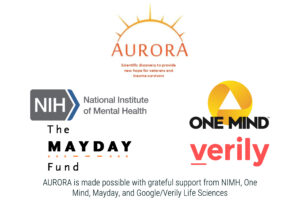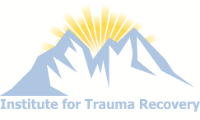AURORA Study
New hope for veterans and trauma survivors
The AURORA study is a major national research initiative to improve the understanding, prevention, and recovery of individuals who have experienced a traumatic event. AURORA is supported by more than 30 million dollars in funding from NIH, One Mind, private foundations, and partnerships with leading tech companies such as Mindstrong Health and Verily Life Sciences, the health care arm of Google’s parent company Alphabet. Five thousand participants who present to a consortium of the leading emergency departments in the nation will be enrolled. Trauma survivors participating in AURORA will receive initial evaluation in the emergency department, followed by intensive multimodal follow-up over a one year period. The wealth of first-in-kind information gained from this study will be used to develop predictive and diagnostic biomarkers and urgently needed preventive/treatment interventions for civilian trauma survivors and military veterans.
The Crisis
More than 2.5 million servicemen and women have been deployed to Afghanistan or Iraq, since September 11, 2001. Post-traumatic stress, depression, pain, and/or symptoms of traumatic brain injury are epidemic among these veterans. The disorders are also common in the millions of Americans who experience traumatic events, such as motor vehicle collision, sexual assault, and the unexpected death of a loved one.
One sign of their depth of suffering: 1 veteran commits suicide in the US every 80 minutes.
The Response
In September 2016, the National Institutes of Health launched the AURORA Study–a 21 million dollar initiative to achieve critical discoveries for new treatments. The AURORA study will be the most comprehensive trauma study ever performed, and involves the efforts of 19 institutions, and 40 leading scientists. Led by scientists from the University of North Carolina and Harvard, this moonshot study will apply the latest tools in physiology, genomics, and neuroimaging to achieve the quantum leap in knowledge that military veterans and civilian trauma survivors so desperately need.

We Need Your Help!
Because of the very high cost of the state-of-the-art molecular, neuroimaging, and bioinformatic methods used in the AURORA study, along with the large scale of the study, the current NIH budget falls far short of the resources necessary to take full advantage of this once-in-a-generation chance to help our veterans, and to help civilian trauma survivors.
Additional Funding Will Allow Us to: Include Sexual Assault Survivors.
1 in 5 women are sexually assaulted, yet no studies have been performed to understand, prevent, and treat post-traumatic stress in this population.
Include Those Experiencing The Sudden Unexpected Death of a Loved One.
This is the most common trauma in the US, yet no large scale studies have been performed to understand how to help survivors heal, and how to prevent and treat post-traumatic stress in this population.
Include Individuals With Major Traumatic Brain Injury.
Including this group would help us to understand post-traumatic stress in the full spectrum of trauma survivors, from those with mild to severe brain injury.
